Almond milk is a beverage made by crushing and pulverizing almonds and soaking them in water, then filtering off the solids.
The result is a tasty and nutrition beverage that’s an excellent source of many of the healthy compounds in almonds, like their polyunsaturated and monounsaturated fats.
While almond milk tastes sweet, its actual sugar content is practically zero, and it compares especially well to other milk substitutes on this front.
Whether you are vegan, lactose-intolerant, or just want something that doesn’t spoil as fast as dairy milk, almond milk is one of the healthiest milk substitutes you can get.
Looking for a high-quality almond milk to add to your diet? We’ve ranked the ten best almond milk products on the market. Read on for details.
Research
Rankings
1. Silk Almond Milk
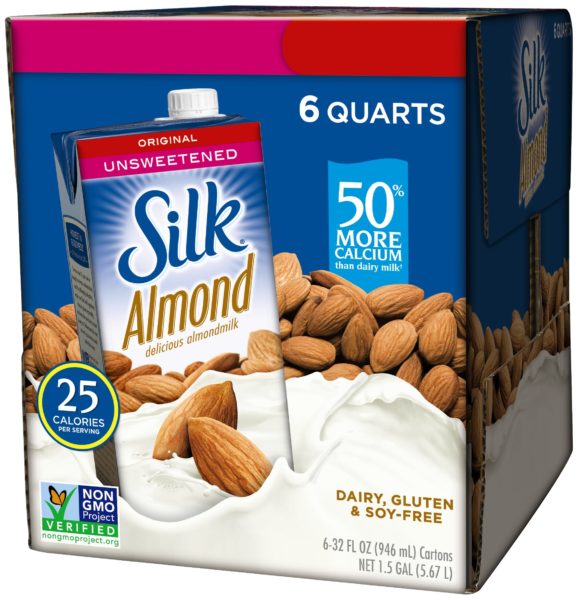
Silk makes a range of dairy substitutes, and their almond milk products are fantastic. If you prefer the naturally mild and slightly tangy flavor of almond milk, go for the original unsweetened almond milk.
If you prefer something tasting a little lighter, you can get vanilla, which is still unsweetened which keeps the carb content at less than a gram per serving.
Most of the calories come from the healthy fats in almond milk, and Silk adds in the nutrients you’d get in regular fortified milk too, like calcium, vitamin D, and zinc. For all of these reasons, it’s our number one pick.
2. Almond Breeze Almond Milk
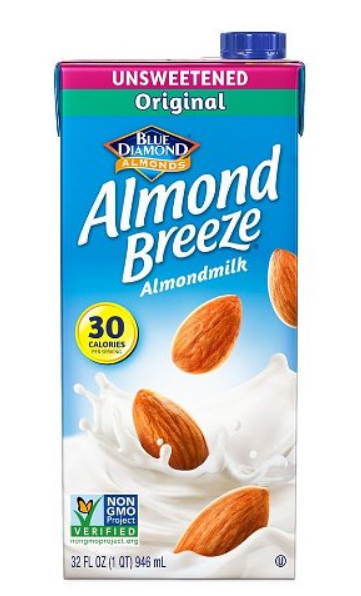
Almond Breeze Almond Milk achieves a smooth and creamy taste thanks to including emulsifiers like sunflower lecithin alongside almonds and water in this almond milk product.
The result is a beverage that’s a little closer to milk when it comes to frothiness, and with fortified vitamins and minerals, you don’t need to worry about nutritional deficiencies.
3. Kirkland Signature Organic Unsweetened Almond Milk
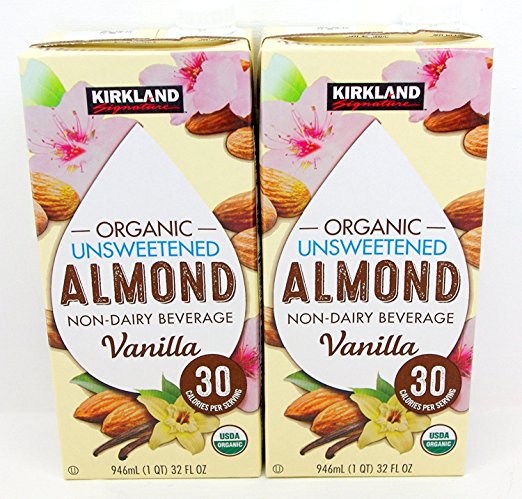
Kirkland Signature is notable for its organic almond milk, so if you want to be sure that your almond milk is free of pesticides and synthetic fertilizers, it’s a good choice.
Almonds grow directly on trees, and the raw almond material is soaked in water to create almond milk, so any residue from pesticides sprayed on to the almond trees stands a decent chance of making it into the final product if the almonds aren’t thoroughly washed. Going the organic route helps avoid this problem.
4. Elmhurst Milked Almonds
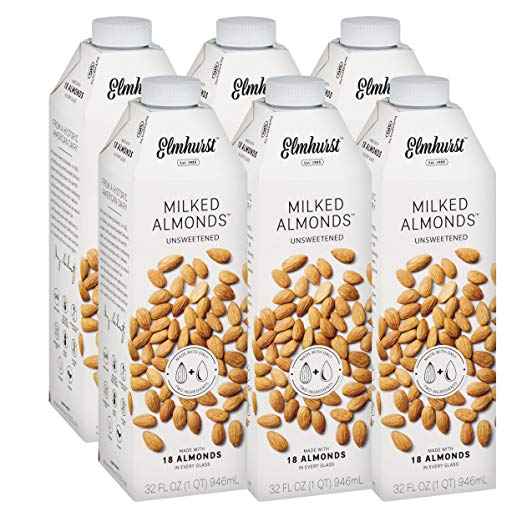
Elmhurst Milked Almonds is an almond milk product that’s about as pure as you can get. With exactly two ingredients (water and almonds), Elmhurst Milked Almonds have all the nutrient value in almonds with zero additives.
This makes it a great choice for people who are on a keto, whole 30, or low sugar diet. The only drawback to this super pure approach is the lack of nutrients like calcium and vitamin D.
Since these don’t naturally occur in almonds, you won’t get them from this almond milk. As long as the rest of your diet or supplementation regimen includes these, you’ll be fine.
5. Orgain Organic Protein Almond Milk
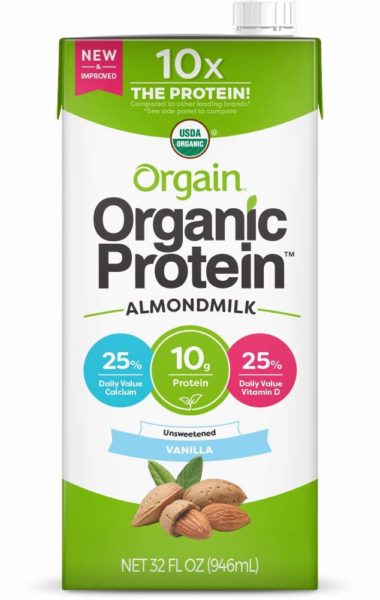
Orgain Organic Protein Almond Milk was created to solve one of the key problems with most dairy substitutes: their lack of protein.
One of the reasons milk is such a useful and versatile beverage is because it has a pretty good protein profile, with both whey and casein protein.
Organ uses pea protein, a great source of many amino acids, to make up for the lack of protein in natural almond milk.
This gives it ten grams of protein per serving, though the downside is that it also has seven grams of sugar, since it also includes cane sugar for flavoring.
6. Rude Health Ultimate Almond
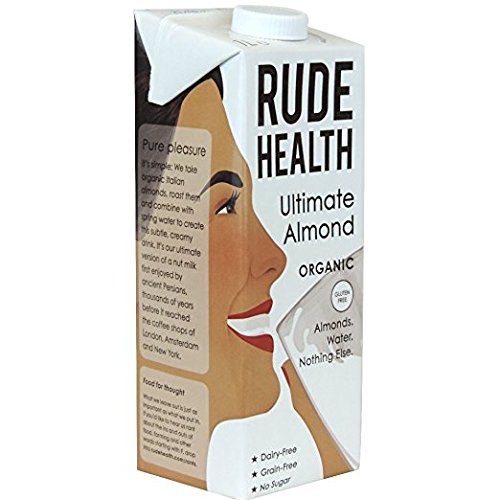
Rude Health Ultimate Almond is a high-end almond milk that uses spring water and organically-grown almonds to make an ultra-pure beverage.
Because the only two ingredients are almonds and water, it’s a good pick for purists, though it suffers from the lack of nutrients that’s inherent in any almond milk beverage that’s not fortified with things like vitamin D and calcium. Users find it especially useful for great-tasting lattes and chai tea.
7. Califia Farms Almondmilk
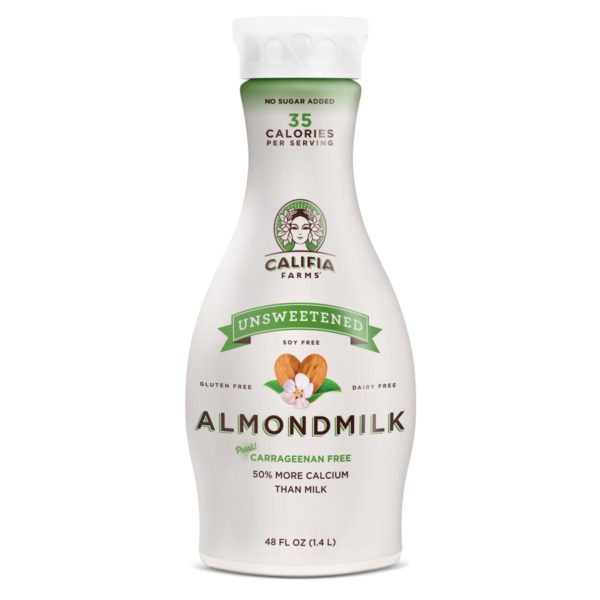
Califia Farms Almondmilk is a more approachable almond milk for people who find regular, unsweetened almond milk too watery and unpalatable.
It’s a sweeter and more enjoyable drink, though this comes at the expense of some added sugar, flavoring agents, and emulsifiers.
This probably rules it out for keto and low sugar dieters, even though it’s only got 5 grams of sugar per serving. For occasional use, however, it’s still a good choice if the moderate sugar content doesn’t bother you.
8. Pacific Barista Series Original Almond Beverage
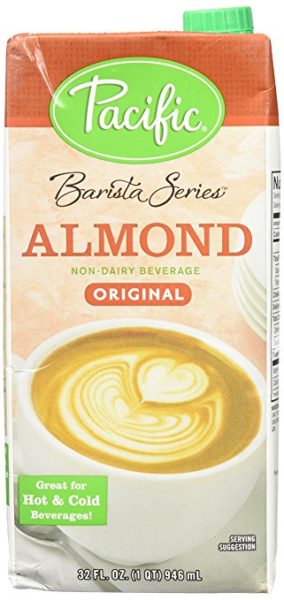
Trying to make lattes or add milk to your morning coffee, but want to eliminate dairy? Pacific Barista Series has the perfect answer.
This sweet, thick and creamy almond milk blends up into a frothy mixture very well thanks to the presence of numerous emulsifiers, and it adds a distinctly sweet kick to any beverage.
However, it does have a considerable amount of sugar, so it’s a no-go for anyone trying to keep their sugar or carbohydrate intake down.
9. Pacific Foods Organic Almond Milk
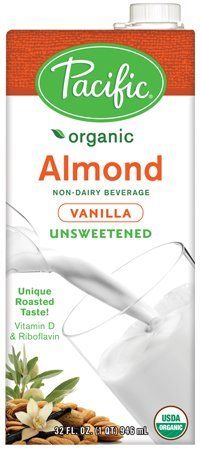
Pacific Foods makes a popular almond milk that tastes sweet, but falls short on a few critical benchmarks. It’s fortified with vitamins and minerals, but notably, not calcium.
In addition, its sugar content is quite high, at ten grams per serving. This makes it a mediocre choice for health and wellness, so unless you need sweetened almond milk for something specific, there are other options that would be a better choice.
10. JOI Almond Milk Concentrate
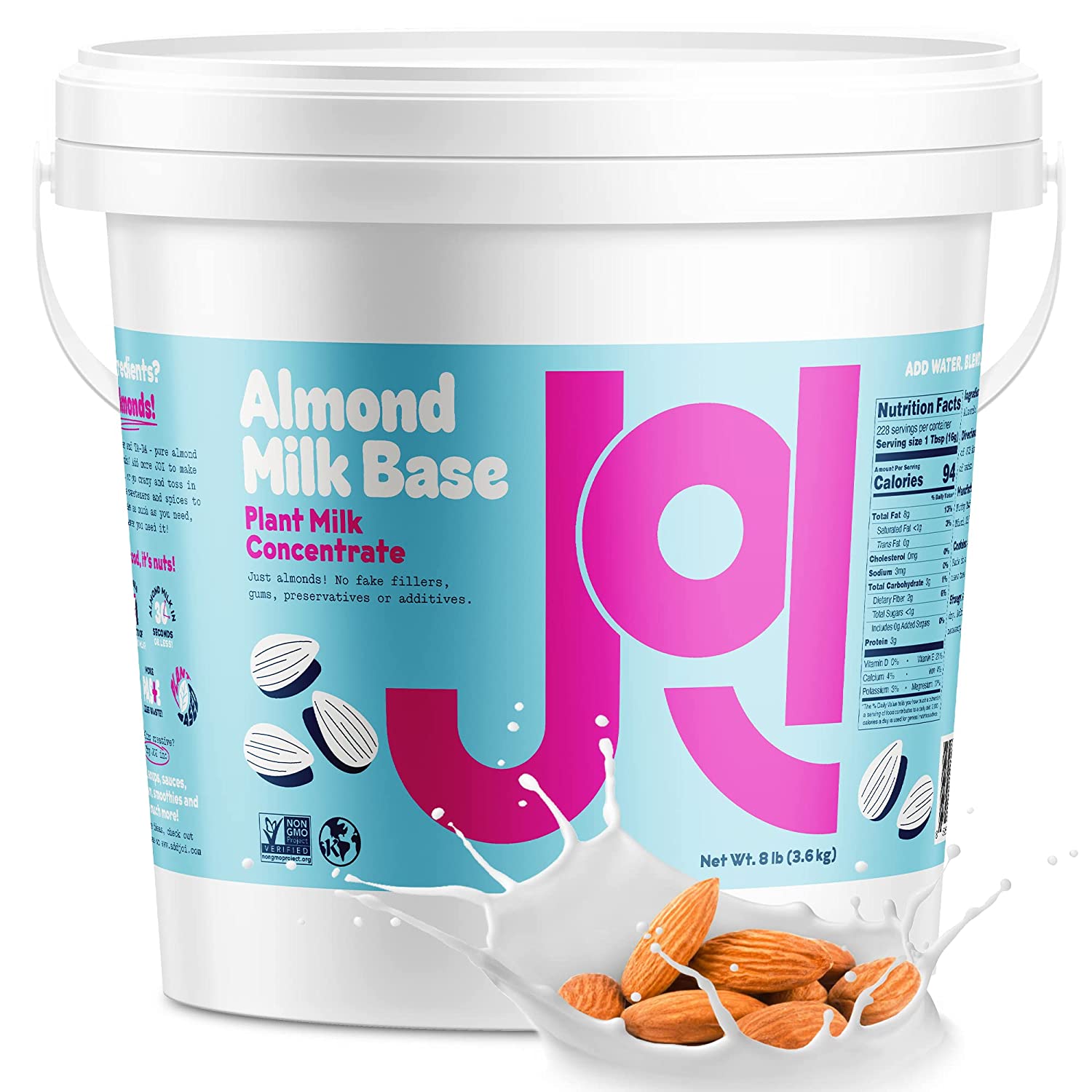
Almond milk concentrate is a pretty niche use case of almond milk, but for those looking for a vegan-friendly almond-based concentrate that’s available in bulk, for cooking and baking, JOI is the way to go. Most users, however, will be better-suited with a traditional almond milk.
Category winners
Best almond milk overall: Silk Almond Milk
Silk takes our top overall spot thanks to its high-quality ingredients and simple formulation. Unlike some of the lower-ranked competitors, it doesn’t add any sugar, and it also provides key nutrients like vitamin D and calcium that you’d get with cow’s milk, so it couldn’t be easier to switch to almond milk with Silk.
Best unsweetened almond milk: Silk Almond Milk
One downside with the increasing popularity of plant-based milk replacements is the tendency for trendy brands to add sugar for sweetness. Not Silk–its unsweetened almond milk preserves the mild taste of raw almond milk and doesn’t bloat the ingredients list with sugar or other sweeteners. It’s a great option for people who want pure and simple almond milk.
Best organic almond milk: Kirkland Signature Organic Unsweetened Almond Milk
If organically-certified ingredients are important to you, check out Kirkland Signature’s almond milk. It uses organic almonds and organic vanilla extract for a flavorful but unsweetened almond milk, and that makes it our top pick for organic almond milk.
Best-tasting almond milk: Almond Breeze Original Almond Milk
Want to switch to almond milk but can’t get on board with the taste of unsweetened almond milk? Give Almond Breeze a shot–it uses a small amount of cane sugar to add back some of the sweetness you’d be expecting if this were rice milk, oat milk, or cow’s milk, but the sugar content isn’t excessive.
Best almond milk for weight loss: Silk Almond Milk
Looking to use almond milk as a low-calorie milk replacement in your diet? Silk Almond Milk is a great option. It’s unsweetened, which keeps the carb content low, and it’s fortified with both calcium and vitamin D which makes it easy to use in place of milk without any additional supplementation or changes to your diet plan.
Who should buy almond milk?
Almond milk is great for most individuals and helps to support heart health and inflammation. It can also support weight loss since it is exceptionally low in calories.
It seems to be safe for children and pregnant women. However, diabetics should be careful as some brands contain a lot of added sugar, which can spike blood glucose levels. It’s best to speak to a medical professional first if you fall into one of these populations.
People with nut allergies should also be careful about consuming almond milk, as it may cause a reaction.
How we ranked
Analyzing the sugar content was of the utmost importance when ranking the best almond milk on the market. This is because a lot of calories can sneak in, turning a healthy beverage into a blood-spiking and waist-expanding nightmare. We specifically looked for products that contained no sugar and still tasted delicious, like Silk. Artificial sweeteners were allowed, but only in small doses due to the lack of long term research regarding safety.
Next, we looked at additives. We preferred products that used no additives, fillers, or binding ingredients to ensure purity. Specifically, we looked for products that didn’t include carrageenan, which is a thickening agent derived from seaweed. Despite being well-tolerated across most of the population, some studies show that it may harm the GI tract – which is why we ranked products that included this a lot lower.
Lastly, we looked for almond milk that was fortified with vitamins and minerals. Since most people are replacing cow’s milk with almond milk, we wanted to ensure that these products were fortified with vitamin D and calcium – so that you aren’t missing out on it. Other vitamins were important too, which is why Silk took the top spot.
Benefits
Almond milk contains oils that are beneficial for heart health. Since almonds are naturally devoid of protein, saturated fat, and most types of carbohydrates, the primary source of the caloric content of almond milk is the unsaturated fats contained in almond oils.
This is the same type of fat you’ll find in other healthy oils, like olive oil. These oils have been subjected to scientific scrutiny to determine whether they have health benefits.
One such study was conducted by researchers at the University of California Davis and published in the Journal of Nutrition in 2002 (1). This study involved two groups of subjects who replaced half of their usual daily fat intake with either whole almonds or almond oil for a period of six weeks.
Knowing that almonds are usually associated with beneficial effects for heart health, the researchers compared the improvements in heart health markers in the almond group to the improvements in the almond oil group. They found no difference, suggesting that the almond oils are the reason for the heart health benefits of almonds.
Namely, in this study, these benefits included decreases in LDL cholesterol (the “bad” type) and increases in HDL cholesterol (the “good” type).
These benefits mirror other research done on the effects of almond compounds on heart health, like a 1998 study published in the Journal of the American College of Nutrition which showed that almond-based diet decreased LDL cholesterol and maintained HDL cholesterol (2).
For heart health and cholesterol control, almond milk is a good choice.
Almond milk contains alpha-tocopherol, which blocks oxidative damage. Almond are rich in vitamin E, and is particularly rich in a form of vitamin E called alpha-tocopherol.
This compound is a potent antioxidant and can protect cells in your body from oxidative damage. Laboratory research, like a study published in the Annals of the New York Academy of Sciences, has found that alpha-tocopherol prevents oxidative damage in a multitude of different animal cells (3).
Moreover, a review study of plant-based milk replacements published in 2016 in the Journal of Food Science and Technology highlighted the free radical scavenging ability of alpha-tocopherol in almond milk as well as other nut milks (4).
This might explain why almonds and almond-derived products appear to be very useful as a part of an anti-inflammatory diet.
Unsweetened almond milk is very low in sugar. One problem with some dairy substitutes is that they use sugar, or compounds that contain sugars naturally, to replace the slightly sweet flavoring that milk has thanks to its lactose content.
This is a problem for people who are trying to avoid the negative effects of sugar, like weight gain, increases in fat mass, and overall inflammation.
Almond milk solves this problem, because the natural sugar content of almonds is very low. According to an analytical study published in the Journal of Agriculture and Food Chemistry, whole almonds contain only 5.5 grams of sugar per 100 grams of raw material (5).
Almond milk has a sugar content that’s much lower than this, because not all of the sugar makes it into the solution. A typical almond milk beverage has less than one gram of carbohydrates total per serving, and only a fraction of this is sugar.
You could drink a good amount of almond milk, even if you are on an aggressively anti-carb diet like a ketogenic diet.
Almond milk helps fight dietary inflammation. Emerging nutrition research is starting to connect disparate diseases, like heart disease, cancer, diabetes, and cognitive degeneration (Alzheimer’s disease and dementia), to similar root causes.
One of these causes is what’s been termed a “pro-inflammatory diet.” As of 2016, there’s even a scientifically validated and empirically derived dietary inflammation index (6), which has been used to uncover associations between dietary inflammation and negative health consequences.
Foods rich in sugar, refined carbohydrates, and red or processed meat are all associated with increased inflammation, but almonds and its constituent compounds are associated with decreased inflammation.
That was the conclusion of a study published in the British Journal of Nutrition which randomized a group of subjects to consume either a high-almond diet or a control diet for a period of four weeks (7).
The researchers found that a few key markers of inflammation went down on the almond diet, indicating that almonds and almond milk are a potentially useful part of an anti-inflammatory diet.
Side Effects
Almond milk may cause digestive distress. In some people, especially those who suffer from IBS or other related digestive disorders, almond milk may cause an upset stomach, nausea, and flatulence. If you experience these issues, you may need to discontinue your use of almond milk, or switch brands.
Almond milk can cause an allergic reaction. In rare cases, almond milk can cause an allergic reaction in certain individuals. If you are normally allergic to tree nuts or seeds, you should be very cautious about consuming almond milk. If you do experience a severe allergic reaction, call 911 immediately and seek out medical attention.
Almond milk can spike your blood sugar. Certain brands of almond milk are packed with a ton of sugar for flavoring purposes. Unfortunately, this can wreak havoc on your blood sugar and be a big problem for diabetics. In addition, it may contribute to a lot of unnecessary calories and weight gain.
Recommended Dose
Since almond milk is high in healthy fats and has practically no carbohydrates or sugars, daily intakes of up to several 8 ounce servings per day are going to be beneficial for your health.
The only potential drawbacks are related to what’s not in almond milk. Though many almond milk products are fortified, naturally, almond milk does not have calcium or vitamin D, which are critical nutrients most people get though dairy products.
In addition, almond milk doesn’t have any protein in it, so switching from regular milk to almond milk might inadvertently decrease your dietary protein intake. An easy way to fix this is to use almond milk alongside a vegan protein powder for protein shakes to keep your protein intake where it needs to be.
FAQ
Is almond milk a healthy substitute for cow’s milk? Almond milk is one of the healthiest substitutes for cow’s milk, thanks to its low carb content, healthy fats, and near-zero sugar levels.
Eating almond-containing foods has been connected with a number of long-term health benefits, and many of the compounds that cause these benefits make their way into almond milk. The constituents of almond milk help fight against dietary-caused inflammation, improve risk factors for cardiovascular disease, and make a great base for healthy protein shakes and meal replacement shakes.
Can almond milk go bad? Almond milk can be a little harder to tell that cow’s milk if it has gone bad, but it does indeed have a shelf life. If you made your almond milk from scratch, or have a small bottle from a local producer, you likely only have around five to seven days of freshness. If it starts to smell off or begins to clump, it has started going bad.
Commercially produced almond milk is often ultra-pasteurized, which means it’s been heated to 280 degrees, and then cooled quickly. This process extends the shelf life significantly. Once you’ve opened the milk, it’s recommended to consume it within seven days, but each product may have a different best before date structure. The best before date is a guideline, so you’re likely okay to consume after seven days, but once the milk becomes thick or clumpy and starts to smell bad, it has expired.
Does almond milk cause bloat? If you have an intolerance to almonds, almond milk may cause bloating or digestive distress. Almonds are one of the more common irritants for those who suffer from irritable bowel syndrome.
Does almond milk cause acne? The research on whether almond milk causes acne is inconclusive. Some research suggests that almonds have vital antioxidants that help the body fight acne breakouts, and other research suggests that the high levels of estrogen in almonds can irritate the skin. The impact of almond milk on acne will vary among individuals.
Can almond milk curdle? Many plant-based kinds of milk curdle when putting it into your morning coffee. This can be due to the temperature of the coffee and the acidity, so it’s suggested that you either add the milk first, while slowly pouring in your coffee to bring the milk up to temperature slowly, or use a low-acid brand of coffee.
Is almond milk okay for infants? For infants younger than one year, they should only be consuming breast milk or formula designed for infants. Almond milk would be a suitable addition to a healthy diet for a toddler, as long as it’s fortified.
Which almond milk is keto-friendly? Plain and unsweetened almond milk is likely keto-friendly, but ensure you are checking the label for any added sugars that can increase the carb content. Sweetened, vanilla, and chocolate almond milk would not be keto-friendly.
Is almond milk vegan? Almost all brands of almond milk are vegan. There is a slight possibility of brands sweetening with honey. However, that is very uncommon because most companies know that many vegans purchase almond milk as a dairy alternative. To ensure you’re not purchasing a brand that does, just check the label before purchasing.
Does drinking almond milk cause kidney stones? If you are prone to kidney stones, almond milk should be consumed in moderation. Due to the calcium oxalate content of the milk, particularly in homemade almond milk, it can potentially cause disturbances (8).
However, more research is needed to confirm these findings from that particular study. If you are prone to kidney stones, please consult your doctor before introducing a large amount of almond milk into your diet.
Can I drink almond milk while pregnant? There is conflicting research about whether almond milk is ideal for pregnant women to consume. Some research suggests that cows milk contains more iodine than plant-based alternatives, so women would benefit more from cows milk. Other research suggests that almond milk is a better option. There is no conclusive evidence to support either claim. If you are pregnant and want to continue or introduce almond milk into your diet, please consult your doctor before doing so.
Is almond milk better than regular milk for weight loss? Almond milk is praised for being low in calories while having a great fat and protein to carb ratio. This can be beneficial for those individuals trying to lose weight while using the calorie counting method. Replacing three servings of dairy per day with almond milk could reduce calorie intake by over 300 calories.
Is almond milk okay to drink on the Whole30 diet? Many almond milk products have added sweetener, so in order to be compliant with the Whole30 diet, an unsweetened variety can still be great for the diet.
Which is the best brand of almond milk? There are many great reputable companies that produce popular almond milk products. There are many products which are better for different purposes. One brand with a great overall flavor is the Silk Original Almond Milk. One of the best for putting in your coffee or tea is the Blue Diamond Almond Breeze Original Almond Milk.
If you want a more rich and luxurious taste, Califia Farms Almond Milk is a great option. If you’re looking for something a bit sweeter, Elmhurst Milked Almonds does have more sugar than other brands, but it is great to satisfy a sweet tooth. If you’re looking for something with more protein, Orgain Organic Protein Almond Milk Unsweetened Vanilla is another great option.
Which almond milk has the most almonds? While most commercially produced almond milk contains a small percentage of almonds, along with additional vitamins, minerals, and thickening agents, homemade almond milk would contain the most, depending on the recipe used. Many brands don’t list the percentage of almonds used, but the Three Trees Unsweetened Almond Milk contains around 20% almonds.
Which almond milk brands are fortified with calcium? Many brands of almond milk are fortified with calcium or have those products available. Brands like Blue Diamond Almond Breeze Unsweetened Almond Milk are fortified with 45% of your daily calcium and have added vitamin D.
Is almond milk bad for the environment? There is a major concern for the environment because of the way almonds are produced in California. Many people who love almond milk are prompted to make their own from scratch at home due to this. Commercially produced almonds require 15 gallons of water for the production of only 16 almonds. This means that almonds are among the most water-intensive crops to produce in the state of California.
Many critics suggest that there isn’t enough of a nutritional benefit to drinking almond milk that justifies the water requirements. Over two billion almonds are produced in California, which results in a lot of water being used, and the required land to produce then has been sourced from converted wetlands. To combat this, you could choose a different type of plant-based milk to consume, make your own at home, purchase certified-organic options, or avoid brands that have added carrageenan.
Is almond milk suitable for those with lactose intolerance? Almond milk contains no dairy and is lactose-free, so it is suitable for those who suffer from lactose intolerance.
Does almond milk break my fast if I am intermittent fasting? Depending on how strict you are during intermittent fasting, a small amount of almond milk may be a suitable option during your fasting hours. Some individuals only drink water and black coffee during the fasted hours.
Popular opinion suggests that any calories during a fast will signal a blood sugar spike, breaking the fast. Other opinions suggest that anything under 50 calories is negligible, so a splash of almond milk in your coffee is okay. The scientific research on intermittent fasting is very limited, and whether or not there is a calorie limit that causes a break in the fast will require more studies to prove a conclusive answer.
Does almond milk help lower cholesterol? Almonds are a very heart-healthy alternative to other dairy products. It’s low in calories, contains no saturated fats, and no cholesterol. Fortified versions are rich in calcium and vitamin D. Almond milk contains polyunsaturated fatty acids, which may help lower LDL cholesterol, reduce inflammation in the body, and improve brain function.
Many options of almond milk are lower in protein than cows milk, so it might not be the ideal choice for everyone. Choosing unsweetened almond milk without added sugar is the best option to reap the benefits that it has to offer.
Is almond milk a good source of protein? Almond milk on its own has a low protein content, so it is not an ideal source of protein. There are brands that produce almond milk with added protein. Brands like Silk and Orgain have options with added protein, containing up to 10 grams per serving. Almond milk is also a great substitute for cows milk or water in smoothies with a scoop of protein powder.
How will I know if I am allergic to almond milk? Almonds and other tree nuts are a very common allergy that tends to be life-long, as under ten percent of children grow out of a tree nut allergy. If you are allergic to almonds, you may experience itching, swelling, nausea, eczema, hives, abdominal pain, vomiting, runny nose, diarrhea, trouble breathing, wheezing, or a more severe anaphylactic reaction.
If you are allergic to tree nuts, you will likely be aware of that before consuming a nut-based beverage, as it typically detected in childhood.
Related Articles
Recap
Almond milk is a fantastic dairy alternative thanks to its numerous health benefits.
Its high content of healthy fats, low sugar and carbohydrate content, and high alpha-tocopherol levels mean it’s great for heart health, fighting inflammation and oxidative damage, and keeping your dietary sugar intake low.
Most people will want to choose an almond milk that’s been fortified with calcium and vitamin D, and add in protein powder if you need to keep your protein intake high.
For BodyNutrition’s #1 recommend almond milk, click here.